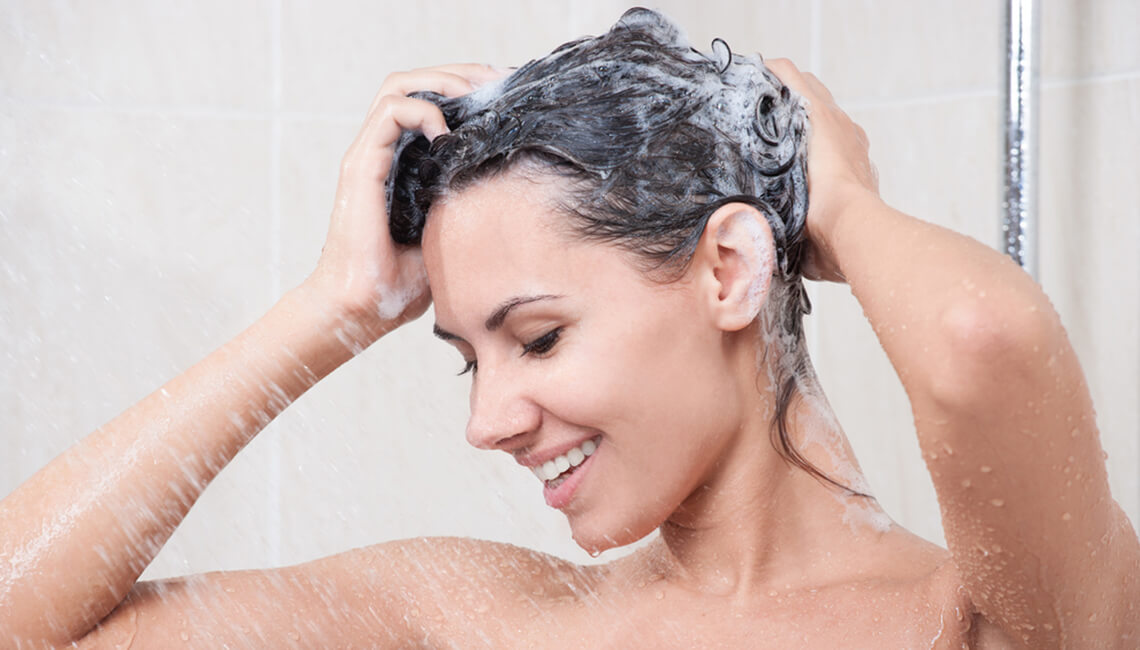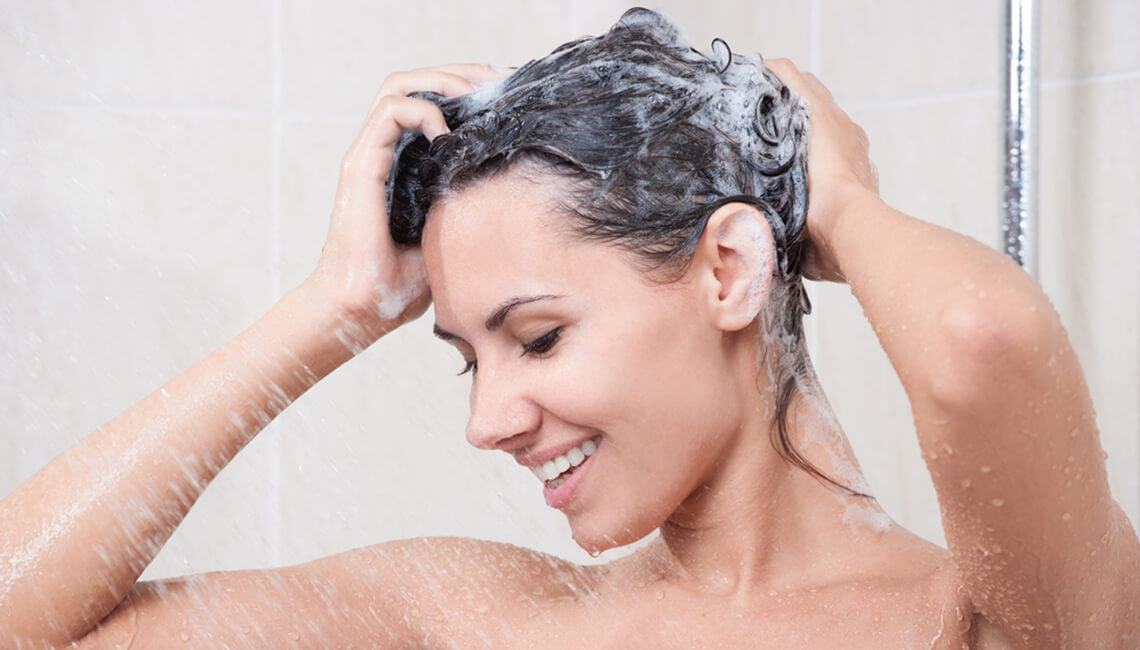Should your favorite shampoo’s foam and sheen become things of the past? We explore whether sulfates in shampoos are doing more damage than you think.
BY Betsey McLain
Years of shampoo commercials have taught that suds and clean hair simply go together, suggesting that luxurious lather is the starting point for great hair. Meanwhile, hidden aggressors have been lurking in your foaming shampoo for years: sulfates. More specifically, Sodium Lauryl Sulfate (SLS) and Sodium Laureth Sulfate (SLES).
Most shampoo brands use SLS and SLES as cleansing agents and surfactants—compounds that reduce the tension between shampoo and hair. In other words: They’re what wash away dirt and oils from your hair and scalp, and help shampoo to lather up. They’re a long-used, inexpensive way to get the job done.
Yes, sulfates effectively clean your hair and scalp, and are approved by the US Food & Drug Administration (FDA) for use. However, studies show sulfates to be allergens and irritants, causing rashes or sensitivity of the scalp. Sulfates can also cause hair loss, fade color-treated hair, dry the hair and scalp, and potentially make curly hair extra frizzy. A 1983 study by The Journal of the American College of Toxicology found that increased skin irritation and hair loss correlated to a higher percentage of concentrated SLS and SLES. The longer the ingredients stay in contact with skin, the more irritation and possible hair loss may occur.
In recent years, sulfate-free shampoos have earned a following as consumers learn the facts about these chemicals. Sulfate-free shampoos bolster shine, flexibility, styling ease, and lasting color. “A sulfate-free formula with natural cleansing agents clears the scalp of oil and allows follicles to breathe,” says Morgan Willhite, creative director of Ouidad, a brand for curly hair.
“It’s about nourishing and conditioning, so hair won’t frizz in any weather.” Star colorist Aura Friedman of the Sally Hershberger Downtown salon in New York City believes sulfates are unnecessary. “It’s safer to cleanse with gentler products,” she says. “Ones that are sulfate-free won’t strip your natural oils, which are important for hair health and shine.” New York City-based dermatologist and dermatopathologist Dr. Vermen M. Verallo- Rowell says there are some irritant—yet notallergic— reactions reported with SLS, but fewer with SLES.
She notes neither SLS nor SLES are on the allergen lists for North American Contact Dermatitis Group (NACDG). “Irritations seem to be directly related to their concentration in the formulation,” Dr. Verallo-Rowell says. “I suggestpatients dilute the shampoo or soap product before applying to the hair and scalp, and rinse thoroughly.
For those prone to allergies or sensitive to topical products, or who have contact dermatitis, I suggest using products that are non-ethoxylated.” According to the Environmental Working Group’s Skin Deep (ewg.org), a non-profit site providing safety ratings for beauty and personal care products, the processing of SLES and SLS—called ethoxylation— can lead to cancerous byproducts Ethylene Oxide and 1,4-Dioxane. “Though a 1,4-Dioxane can easily be removed from products before they are sold, its widespread presence in products indicates that many manufacturers fail to take this simple step,” reports Skin Deep.
A series of 2008 studies shows that 1,4-Dioxane contaminates up to 46 percent of personal care products tested. The Consumer Product Safety Commission agrees that the presence of 1,4-Dioxane, even as a trace contaminant, is cause for concern. According to the Campaign for Safe Cosmetics (safecosmetics.org), since 1,4-Dioxane and Ethylene Oxide are byproducts of ethoxylation, the FDA doesn’t require them to appear on any ingredients labels, and research shows that 1,4-Dioxane easily penetrates the skin.
“We are concernedabout ingredients ending with ‘eth’—including Sodium Laureth Sulfate—because of the possibility of 1,4-Dioxane and Ethylene Oxide contamination,” says Sarada Tangirala, the Campaign for Safe Cosmetics’ grassroots coordinator. “Sodium Laurel Sulfate, a chemical that is harsh on the skin, is often converted to the less-harsh chemical Sodium Laureth Sulfate via ethoxylation.” Seventy percent of what’s topically applied to your skin is absorbed into the bloodstream. Hair produces sebum, a natural oil that adds shine and movement while preventing infection.
If you strip that natural sebum with sulfates, you risk exposure to harmful chemicals in shampoos, conditioners, or styling products. Plus, you risk eliminating natural oils from your hair, starting a cycle of dryness that your scalp fights to regulate by overcompensating with extra oils. The result? Your locks get greasier, faster. When you go sulfate-free, hair balances oil levels and retains more natural oil. We’re all devoted to our favorite brands.
However, it may pay to ditch your traditional shampoo for a sulfate-free version. If you’re still set on lathering up with your favorite foam, keep in mind that sulfates are relatively, and officially, safe for use—and likely more wallet-friendly, too. Just remember to rinse well… very well.
THE SULFATEFREE SWITCH
From color-treated to curls, there’s a sulfate-free shampoo for that.VMV Hypoallergenics Essence Skin-Saving Clark Wash is free of all SLS, SLES, preservatives, phthalates, dyes, and parabens. ($30, vmvhypoallergenics.com)
Serge Normant If you want to boost the blonde, Meta Blonde Reviving Shampoo shines a sulfate-free light on your shower time. It uses Moroccan cedar bark extract, the hair strengthening complex Keravis, and “shimmering gold enhancers” to draw out your inner platinum beauty. ($26, sergenormant.com)
Bumble and bumble Color Minded Shampoo is formulated to prevent fading and ensure a healthy head. ($29, bumbleandbumble.com)
Yes to Blueberries Healthy Hair Repair Shampoo has lots of nourishing ingredients and is free of SLS and parabens. ($8, yestocarrots.com)
Maijan Pure Argan Oil & Mint Hydrating Shampoo is oil-based for a gentle, super-healthy clean. ($22, stylebell.com)
Dr. Mandel’s sulfate-free Antioxidant Shampoo combines argan, Kalahari melon, olive, and mongongo oils as well as antioxidants, making it the perfect anti-aging solution for dyed hair. ($24, mandel beautyproducts.com)












